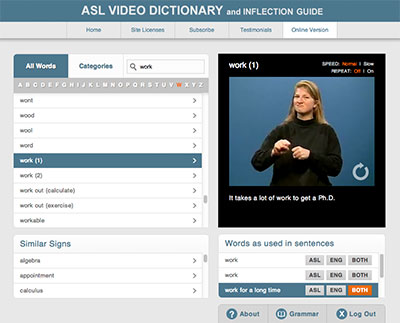
Why is this ASL dictionary different?
About 11,000 copies of the ASL Video Dictionary and Inflection Guide have been sold and are in use throughout the U.S. and Canada.
The ASL Video Dictionary and Inflection Guide shows thousands of signs in crisp color video and links them to sentences that demonstrate how they change to convey different meanings. This is critical because unlike English words, ASL signs change - inflect - from sentence to sentence to show different meanings. The sign for help, for example, can change to mean help me, help them, help for a long time, etc.
The experts at RIT's National Technical Institute for the Deaf have developed this innovative dictionary that not only shows you 2,700 signs, but shows most of them in sentences. You can see the inflections and learn how they work to help gain a true understanding of the language of ASL, not just a list of its vocabulary.
This powerful program has many interactive features to help learn and study ASL.
Contact Geoff Poor for more information.
Features
- 2,700 ASL signs and English equivalents
- 2,000 signs linked to at least one of 650 sentences that illustrate how the signs change to show different meanings
- English translations of sentences
- Similar Signs -- signs that look alike -- are separately grouped for easy comparison
- All signs and sentences performed by Deaf native signers in high quality QuickTime movies
- Various options for viewing the sentences: ASL first, English second; English first, ASL second; both simultaneously; and various default and replay options for order of presentation and signing speed.
- A complete help file to guide you
- An on-line text section that discusses both ASL inflection and ASL sentence structure, with video examples.
- CD version works on both Macintosh and Windows platforms.
-
1,000 signs grouped into 26 categories:
- Countries
- States
- Cities
- Government
- Money
- Numbers (general)
- Numbers (time)
- Numbers (age)
- Numbers (money)
- Animals
- Transportation
- Alcohol
- Food
- Furniture
- Sports
- Bath
- Clothing
- Careers
- Religions
- Disabilities
- Classifiers
- Idiomatic Signs
- Lexicalized Fingerspelling
- 12 Step Programs
- Socially Restricted*
- Substance Abuse*
* Socially Restricted and Substance Abuse can be removed for an account by request. Send requests to gspncm@rit.edu and include the username of your account.
Users
- Elementary through high school and college ASL students
- Vocational rehabilitation and other counselors
- Interpreting students
- Families of deaf children
- Deaf people improving their English
- Teachers and school staff
- Other social service workers
- Day care staff
- Anyone who wants to learn ASL
Major funding provided by FIPSE (Fund for Improvement of Postsecondary Education) program, US Department of Education. Additional funding provided by the Carl and Lily Pforzheimer Foundation and the Gannett Foundation.